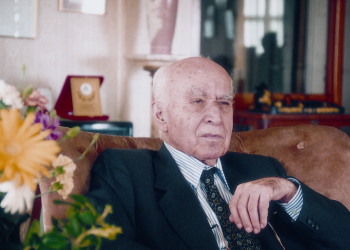
He used to give great importance to thriftiness and avoid squandering and had lived with the sense of economy. During his lifetime no one could see food on his plate or water in his glass left. According to him it is wasting to trash the printed papers without using their blank sides. For him, the way to achieve success is the determination, patience, perseverance, courage and hard work.
He was the first to come for his rendezvous.
He would read his newspapers in the mornings giving attention to every detail. He was interested in the matters of Turkey but he was not involved in the politics. However, he was in the idea that not enough had been done for Turkey nor it was being done then.
He would play the violin when he was young. He practised to play the tambour in his balcony-cum-glass- room in his house in Büyükdere, Sarıyer in his olden days.
He was fond of Turkish Classical Music and he greatly enjoyed listening to almost all old cassettes and records of the great musician Münir Nurettin Selçuk.
He loved reading detective and adventure novels and going to the theatre. He was one of the founders of Istanbul Art and Culture Festival.
He loved travelling but especially more so the cruising.
He took great interest in gardening. He grew canaries at one point but later raised orchids by artificial insemination.
He was a modest person. Despite making lots of charitable works, no one had ever seen him boasting about them.
He talked less and worked more. The most important quality of him was to learn what he did not know.
He was not reluctant to ask a wise man about the things he was curious.He was very sensitive about dressing smartly, was moderate with eating and drinking. He was neat both at home and work.
For him, money was a good friend, and an enemy to be fought against. For this reason, one should know when and where to use it; he would say that “one should not be the captive of money”.
His religious beliefs were very strong. He would do his best for not to miss the daily prayers both at his home and work. He would pray at home if he missed any during the day. He delegated for his pilgrimage. His thought about the belief was that “no one can intervene between the God and a human being”.
He was the man of wisdom and logic and he was a real human being before anything else. He was respectful and gave great importance to every idea. He approached friendly to everyone regardless of whether he/she was young or not, rich or poor, acquaintance or not. It is wondrous whether this humane aspect of him that made him different from other benefactors.
Ten golden advice
(Here are some mottos of Izzet Baysal, which he liked and recommended to everyone for a happy life:)
1. Have time for thinking; it is the source for power..
2. Have time for fun; it is the secret of youth..
3. Have time for reading; it is the source of knowledge.
4. Have time for praying; it is the support of perseverance in difficult times.
5. Have time for love; it is the thing that sweetens the life.
6. Have time for getting on well; it gives life a nice taste.
7. Have time for laugh; it is the beauty of soul.
8. Have time for giving; it is the light of the day.
9. Have time for working effectively; it makes one to have self-respect.
10. Have time for thanking; it is the cream of the cake of life.